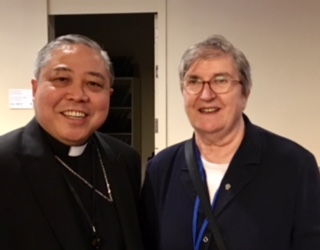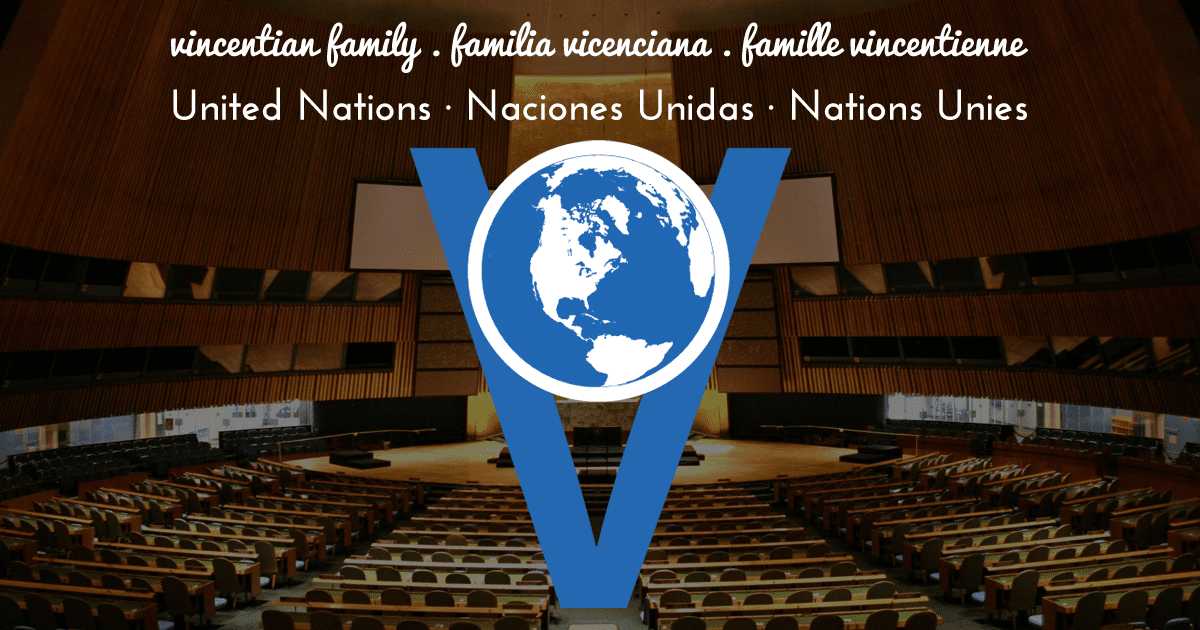Vincentian Family at the U.N: Migration
UNITED NATIONS SEEKS INPUT ON GLOBAL MIGRATION COMPACT
Vincentian Family members have a great deal to say to the world about migration issues. What would you include in an international agreement related to migration?
The United Nations is gathering various opinions on this subject as it prepares for a global compact on migration, targeted for approval in 2018. To ensure the process is consultative, the UN is holding a series of sessions on migration themes. The meetings are taking place in Geneva, Vienna, and New York. (In addition to the thematic consultations, regional and other meetings also are scheduled to ensure a complete view of migration-related concerns).
The second of six gatherings on specific migration topics occurred May 22 and 23 in New York. Its focus was the drivers of migration. (The first meeting took place in Geneva, May 8-9, on the human rights aspect of migration).
Upcoming UN Events/Days of Recognition
June 5-9: Oceans Conference
June 8: World Oceans Day
June 12: World Day Against Child Labor
June 13: International Albinism Awareness Day
June 14: World Blood Donor Day
June 15: World Elder Abuse Awareness Day
Three panels during the New York meeting addressed sustainable development and poverty eradication, human-made crises as drivers of migration, and the adverse effects of climate change and natural disasters as causes of migration.
“Our focus should be on addressing the causes that deprive people of their dignity, their safety, their homes and families and which force them to abandon their homes and communities,” stated a brief issued ahead of the meeting. “We need to develop – and implement – policies that make it possible for people to realize their potential, meet their needs and fulfill their aspirations, alongside those communities from which they come and those which receive them.” Link to Issues Brief #2: https://refugeesmigrants.un.org/sites/default/files/issue_brief_ts2_final.pdf
The brief addressed three key drivers of migration:
- Economic and demographic drivers (employment opportunities, poverty, food insecurity)
- Environmental drivers (climate change and natural disasters)
- Human-made crises (conflict, corruption, abuse of human rights)
People may migrate to access better economic, employment and educational opportunities for themselves and their families, the brief notes. Some migrate due to lack of access to fundamental human rights such as health, food or basic education, and due to discrimination, poverty or separation from family. They may move in response to crisis – both natural and human-made (i.e. conflict) – and, increasingly, in response to environmental change.
The process of preparing the global compact “requires us to explore ideas that might help give shape and form to our collective commitments,” said Louise Arbour, UN Special Representative for International Migration. “That will only come if we are brave enough to explore concrete proposals without fear. This requires listening to each other; it also requires pushing the envelope – exploring the possible, rather than simply pointing to the impossible.”
Recommendations arising from contributors included such things as strengthening the collective capacity to prevent and manage conflict; eradicating poverty and promoting sustainable, inclusive economic development; remedying the lack of educational opportunities for some; promoting human rights; combatting xenophobia; including women in peace negotiations; expanding legal pathways for migration; addressing vulnerabilities of migrants in conflict situations; paying more attention to internally displaced persons (in addition to those displaced internationally); improving efforts at reintegration of migrants in their new locations; and reducing the costs of remittances.
Additional suggestions included enabling people to live safe and productive lives; providing decent work opportunities, especially among youth; aligning the global compact on migration with the sustainable development goals and Paris Climate Agreement; promoting the empowerment of women and girls; improving social inclusion policies; improving education and training around migration; creating a shared future for mankind; implementing the Sustainable Development Goals; provide innovative mechanisms for skill sharing; encourage nations to follow the Migrants in Countries in Crisis guidelines; promote more research on climate-induced migration; increase disaster risk responsiveness; and establish a legal regime which afford basic rights to people displaced by climate change. Many ideas were offered.
Said the Holy See in one of its statements, “More than half of the world’s refugees, forced migrants and internally displaced persons have been forced to abandon their homes and properties and, indeed, to flee their countries, because of conflicts and violence, the tremendous negative impact of which continues in the odyssey of the victims. They face the dangers of trafficking in persons, starvation and many forms of abuse. Upon arriving at their destination, rather than finding a safe haven, in many places they find mistrust, suspicion, discrimination, extreme nationalism, racism and a lack of clear policies regulating their 2 acceptance. Clearly, the most effective way to stop massive movements of forced migrants and refugees is to stop the wars and violent conflicts that cause them.”
The session’s brief reports that the number of international migrants reached 244 million 1 in 2015, the highest total in recorded history and a 41% increase since 2000. As a percentage of global population, migrants today constitute just 3.3% of the global population, a percentage that has increased only slightly from 2.9% in 2000, the brief shows. It also reflects that the numbers of people moving internally within their own countries exceeds the number of people who have moved internationally across borders.

Archbishop Bernadito Auza, Permanent Observer of the Holy See to the UN. He is featured with Sr. Catherine Prendergast before a side event at the UN
Arbour pointed out the importance of international cooperation (which will include compromise); getting help to those who need it first; and both combatting the causes of migration and expanding safe channels for regular migration.
A great deal was mentioned during the late May meetings about addressing climate change. “Our country’s survival is based on the people living in the Marshall Islands, not elsewhere,” said Ambassador Amatlain Elizabeth Kabua, from the Marshall Islands. She noted that if land is lost, so is identity. “We cannot endlessly adapt,” she said. She noted the importance of honoring the Paris Agreement.







0 Comments